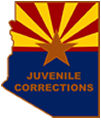Victim Frequently Asked Questions (FAQ's)
What benefits are there to registering with the Victims' Rights Unit?
Victims of juvenile crime are entitled to certain legal rights, including, but not limited to, the right to be notified of the youth's status and the right to be included in any hearing where the youth's release is being considered; however, you must "invoke" (opt-in) these rights by registering with the ADJC Victims' Rights Unit.
How do I register with the Victims’ Rights Unit?
You can register for victims’ rights services by completing a “Post-Adjudication Notification Request” (PANR) form and sending it to the Victims’ Rights Unit. You should have received this form when your case was decided by the juvenile court and/or when the youth was sent to the Arizona Department of Juvenile Corrections (ADJC) . If you did not receive a PANR form, you can request one from the Victims’ Rights Unit at (602) 364-3513 or 1-800-387-3062.
What happens once I register?
After you register, you will begin to receive notification letters regarding your case. These letters are automatically generated to notify you whenever there is a change in the youth’s status. The letters are also generated to notify you, in advance, of upcoming hearings in which you have the right to attend and speak on your behalf or have a Victims’ Rights Specialist represent you. Shortly after the Victims’ Rights Unit receives and processes your registration, you will be assigned a Victims’ Rights Specialist, who will be your primary contact person and advocate. Your Victims’ Rights Specialist will be able to answer your questions and address any concerns that you have regarding your case.
How much involvement can I have in my case?
You can determine how involved you would like to be in your case. Some victims are highly involved in their cases. For example, they may be in regular contact with a Victims’ Rights Specialist to track restitution payments, develop safety plans, pursue protective orders, attend hearings, etc. Other victims do not want any personal involvement, choosing instead to stay updated by simply receiving the automated notification letters. The level of involvement in your case is completely up to you.
What are some common victim concerns that the Victims’ Rights Unit can assist me with?
According to feedback from victim surveys, the two (2) most common concerns for victims are safety and restitution. Regarding safety, the Victims’ Rights Unit can assist you in creating safety plans, filing for protective orders against the youth, and addressing any other safety concerns that you might have. Regarding restitution, the Victims’ Rights Unit can monitor the youth’s payments of court-ordered restitution and serve as an advocate on your behalf in trying to facilitate payments. For many victims, their primary concerns are related to what happens when the youth is released back into the community. The Victims’ Rights Unit can help address these concerns by providing input into the youth’s parole plan, such as including “no contact” provisions to make sure the youth avoids any contact with the victim, and addressing the victim’s safety concerns.
What if I want to be involved in my case, but don’t want any contact with the youth?
You will never have to come in contact with the youth if you do not want to. Your Victims’ Rights Specialist will do all that they can to make you feel safe and comfortable. For example, if you want to attend a release hearing but do not want to see the youth, the Victims’ Rights Specialist can make sure that you are never in the same room as the youth, and that the youth is removed from the hearing room before you enter to speak to the Release Board. The Victims’ Rights Unit can also make sure that the youth is instructed not to initiate contact with you in any way (writing, telephone, etc.) while the youth is under ADJC care.
What if I would like contact with the youth?
Victims’ Rights Specialists can plan meetings between the youth and victim(s) in a safe and secure place. These meetings are called “Clarification Sessions.” Clarification Sessions bring the youth and the victim together to talk about the impact of the offense on the victim, and for the youth to take responsibility for his behavior. Victims are accompanied by their Victims’ Rights Specialist, and the youth is accompanied by secure care staff, usually their caseworker and security staff if necessary. Clarification Sessions must be approved by both the victim/Victims’ Rights Unit and the youth and their caseworker(s). In some cases, youth are not ready or able to participate in a clarification session. If you think you might be interested in pursuing a clarification session, please discuss the opportunity with your Victims’ Rights Specialist as early as possible.
What happens when a youth is released from secure care?
Any youth that is released from a secure care institution will remain under ADJC jurisdiction until his/her 18th birthday. The youth will be assigned a parole officer, who will create a supervision plan for the youth that highlights the youth’s rules and regulations while on parole. Registered victims can submit a request for a copy of the supervision plan through the Victims’ Rights Unit. Further, the Victims’ Rights Unit can work with victims to ensure that their concerns are addressed within the youth’s supervision plan. For example, supervision plans often include provisions for monthly payments toward restitution or “no contact” provisions for victims. All youth are released from ADJC jurisdiction once they turn 18 years old.

